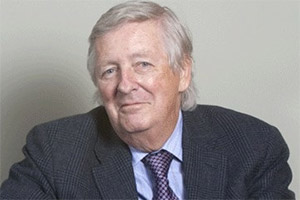
Dick Clement
- 87 years old
- English
- Writer, director and producer
Press clippings Page 6
Yes, Porridge WAS the greatest show ever
An affectionate tribute from the creator of Birds of a Feather.
Maurice Gran, Daily Mail, 8th October 2009Porridge is 'best programme ever'
Porridge, the television comedy about life behind bars, is the greatest programme ever made, according to Sir David Attenborough.
The Telegraph, 6th October 2009"Don't mind Eddie, he likes to call a spade a spade. It's when he calls me a spade that I mind!"
Such is the power of sitcom that those two lines from Love Thy Neighbour are still fresh in my memory after nearly 40 years. Possibly because it is such a dreadful joke, possibly because every joke in Love Thy Neighbour was a variation on it.
Back in the seventies and early eighties, the humble sitcom was the meat and potatoes of British broadcasting, providing millions with unsophisticated but satisfying fare. This was before the genre was elevated to an art form, subjected to quality control and critically scrutinised to death. Or called a genre, for that matter.
Beyond a Joke takes us back to those glory days and places classic, and not so classic, British sitcoms into their social and historical context.
Which makes Beyond a Joke sound as dry as dust, but it really isn't. For one thing, the programme takes full advantage of the archives, cherry picking all of the best moments to make its point. And in a welcome change from the usual clip show convention of recruiting unknown stand-up comedians and former children's TV presenters to blab inanities, it invites actual informed opinion from such illustrious contributors as Tony Benn, John Cleese and Dick Clement.
Episode one was all about class, a rich vein of humour that sitcoms of the period mined extensively. We saw Captain Mainwaring bristle with indignation as Sergeant Wilson joined the golf club, Basil Fawlty fawning over an aristocratic guest, Margot Ledbetter locking horns with the local council. Plus Stan from On The Buses trying to sneak a dolly bird upstairs past his disapproving extended family. Which accurately reflected the enduring post-war housing shortage, but made a less than convincing case for Reg Varney as a sex god.
All of which was linked by Dave Lamb's suitably jaunty narration.
Harry Venning, The Stage, 8th May 2009Whatever Porridge had could not be replicated. Clement said: "The BBC invited us to a thank-you lunch, which went on till five o'clock. After the seventh large brandy, we walked out of there having agreed to do a sequel called Going Straight." It had precisely the same ingredients. It failed. So did a film. Porridge itself can be seen on Thursdays doing its characteristic impression of a daisy.
Nancy Banks-Smith, The Guardian, 10th June 2003Despite the shortcomings in the plot, Auf Wiedersehen, Pet has been the best "new" British drama on TV this year. Its return, whilst critically not quite living up to its previous two series, has still been very welcome indeed.
Graham Kibble-White & Jane Redfern, Off The Telly, 2nd June 2002The big TV event of the week is the return of Auf Wiedersehen, Pet (BBC1), something I'm unqualified to comment on with any degree of authority, having been too young to appreciate the original ITV series, which at the time seemed to consist entirely of slightly frightening men standing in a Portakabin, bellowing at one another in a dialect I didn't understand.
Charlie Brooker, The Guardian, 27th April 2002Weak television, but nevertheless a well deserved tribute to two writers whose place in TV heaven would be assured, had they not been rash enough to give Christopher Biggins Porridge.
Victor Lewis-Smith, Evening Standard, 21st July 1997Of course, such a seminal series deserves to be shown again, but the partnership was only at its best in Whatever Happened To The Likely Lads, when Bob had become middle-class, Terry had inexplicably acquired a Geordie accent, the horrendous Thelma had appeared, and the ingredients were finally in place for a serious comedy about class and sex.
Victor Lewis-Smith, Evening Standard, 14th July 1995It is well worth a watch. At the worst you learn how to spell Widersehen just as that deplorable business with the Barlows taught us how to spell Dierdre. Hang on, Deirdre. No, I before E except...
Nancy Banks-Smith, The Guardian, 12th November 1983But if you want to hear how the use of language can be the making of a series, the re-run of Porridge (BBC2) is the show to watch. Those scripts by two writers were gold in every molecule. 'Her flat fell through.' 'Fell through to the flat beneath, I expect.' When you recover from laughing at the way Ronnie Barker delivers it, you realise that a lot depends on how the writers wrote it: the word 'beneath', in particular, is perfectly chosen and placed. Years from now, when all those semi-documentary, semi-improvised, semi-truthful epics about working-class rebellion have dated hopelessly, the work of Galton and Simpson and two writers will still be there to testify that there really was such a thing as common speech with a rhythm of its own.
Clive James, The Observer, 24th January 1982